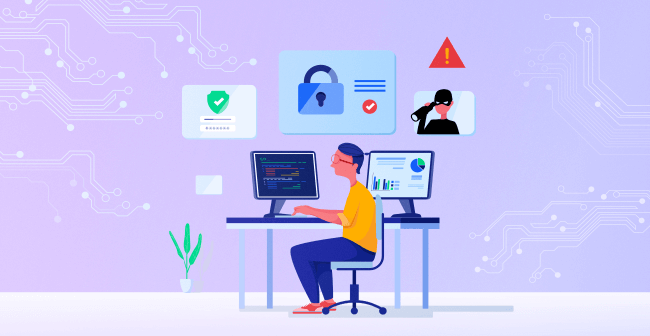Technology is an essential part of any business, regardless of its size. Because of it, communication processes have been made easier, fast, and more reliable. Efficiency in business operations and teamwork have improved with its help. Staff workload has also been minimized, resulting in increased productivity.
That said, technological improvements are happening quite rapidly. Therefore, some business owners are finding it hard to keep up. Some entrepreneurs don’t improve their technology because new advancements are expensive, and fear the improvements won’t work well for them.
In addition, they trust that their old information technology (IT) infrastructure will still be more efficient. They’re also concerned about the time and money required to train their personnel on current technologies.
Though the above are valid fears for any entrepreneur, improving a company’s technology is essential. This is because outdated software and hardware can harm an enterprise’s productivity, performance, customer experience, and reputation. Moreover, your competitors being ahead of you may cause you to become irrelevant in the market. This can cause dire consequences like slow growth, loss of customers, and eventual closure of your business.
Indications That Your Company’s Technology Needs To Be Upgraded
As mentioned, there’s a great need for businesses to keep up with the changing technology. However, it may be challenging to determine when you, as an entrepreneur, should perform the necessary updates in your company. Hence, this article outlines the signs that indicate your technology may need an upgrade:
1. Rapid Company Growth
If you’re experiencing rapid growth in your business, there are many changes to make. For instance, you may need to hire more staff members, improve customer service, and open new branches in other locations.
That said, it’s important not to forget to update your technology. It’s because the hardware and software that worked for you as a small company may not be sufficient for your scaling business. Essentially, you’ll be dealing with more orders, data, customers, cash flow, production, and suppliers.
In this case, you need advanced technologies to help you store information securely, automate processes, improve communication, and efficiently manage data, employees, sales, and cash. These can accommodate the growing needs of your company.
Even so, it can be challenging to identify the technologies your growing business needs. Therefore, working with an IT expert is recommended. You can hire a full-time team or outsource this department from an IT company.
A professional on your team is essential because they’ll identify the needed technology updates and advise you on the cost of those upgrades. Also, they’ll set up, manage, and solve IT infrastructure issues, offer support to your staff, and ensure top-notch cybersecurity. Generally, they’ll ensure your IT department runs smoothly at all times.
2. Increased Energy Bills
Printers, computers, servers, and other hardware have a limited life. If you keep them longer than expected, they’ll consume more power. This can happen because they’re running slowly or working too hard to perform advanced functions. Also, it may be due to insufficient memory or dust accumulation, meaning fans have to work harder and longer, thereby using more power and causing overheating.
If this is the current situation in your firm, it’s time for you to update your technology. High energy bills will likely affect your business’ profits. If you put off upgrades because they’re costly, you’ll only be doing more harm than good. In truth, newer hardware in the m犀利士
arket is energy-saving, efficient, easier to maintain, and more secure. Overall, they can lower your firm’s operating costs.
3. More Downtime Is Experienced
A company’s downtime refers to a time when processes stop entirely or partly. This can happen due to a power outage or a natural disaster. However, technology failure is many firms' leading cause of business downtime. This can result from poor internet connectivity, cyberattacks, or hardware, software, network, server, storage, and system flaws. Unexpected downtime of any kind can be financially devastating. Also, it can cause customers to lose trust in your firm, damage your reputation, lower your productivity, and make you lose business opportunities.
It might be time to update your IT infrastructure if you’re experiencing downtime often due to technological failure. It’s best to consult an IT expert in this case. They’ll examine your systems, hardware, servers, networks, and software to identify the causes and possible solutions to the current problems. Also, they’ll advise you on how to implement the necessary upgrades.
Furthermore, they’ll provide other ways your employees can keep working to minimize downtime effects. For instance, they may suggest other communication channels to ensure continued customer service.
4. Changing Consumer Behavior
Technology is a major factor in influencing the change in consumer behavior. Today, more potential buyers perform product research on the internet before purchasing something. Also, most prefer buying online because they don’t have the spare time to shop or spend hours in queues. But with technology, they can purchase a product any time, check reviews before buying something, and have the seller organize the delivery.
This change has caused more companies to evolve fast to adapt to customer behavior and preference shifts. Today, you’ll find that most brick-and-mortar shops also have an online store where customers can have an easy, time-saving, and convenient buying experience.
However, this change requires you as a business owner to update your technology because what you have for your physical store may not be sufficient to run an online platform. For instance, you must have an e-commerce website, order-tracking software, a digital payment processing system, and a social media management tool.
As an entrepreneur, it’s best to keep yourself updated on the changing consumer behaviors and preferences. Also, it’s best to find ways to meet their shifting needs. This way, you’ll remain relevant in the market, and your business will likely survive.
5. Increased Cybersecurity Attacks
It’s essential for all businesses, regardless of size, to prioritize cybersecurity. This way, you’ll protect your company, staff, and customer data. Moreover, you’ll prevent unnecessary interruptions, reputation damage, and financial losses that cyber-attacks cause.
If you’ve recently been experiencing more security breaches, it may be because you’re still using old computers and software. Since cybercriminals are always looking for new ways to steal, destroy, or gain access to data, it’s easier for them to find loopholes in older technologies. Therefore, your company is more vulnerable to cyber-attacks if you don’t upgrade your IT infrastructure. This is because your old technology may not be compatible with advanced antivirus software and other security programs and tools.
Upgrading to newer technology will enable you to implement the latest cybersecurity practices. This way, you’ll protect your data better. As a result, you’ll maintain a good name in the market, gain customer trust, and attract more business opportunities. Moreover, you’ll ensure the smooth flow of business in your company and avoid unnecessary revenue losses.
6. Low Productivity
Old business technology takes longer to upload and download data. Also, they connect slowly, break down often, take time to process data, and don’t integrate or interact well with other systems. Overall, they negatively impact employees’ morale, leading to poor-quality services and low staff output.
The above effects can damage your reputation and cause customers to shift to companies with more advanced technology. Moreover, you may also experience a decline in your revenue because of lost productivity.
Advancing to newer, faster, and more efficient technology can help you prevent the above consequences. Staff feedback on the current software and hardware performance can help you identify aging technology. Also, regular inspection by an IT expert will help you know what needs to be upgraded before they significantly affect your business negatively. The professional will also help you find other technologies that can help boost productivity in your company. These can be cloud-based collaborative tools, time management software, and others.
7. Requirement For Remote Employees
Remote working has been embraced by many companies today. This is because it provides access to a larger talent pool, makes it easier to find pre-trained employees, and reduces the cost of rent, equipment, and utilities. Remote workers are also more productive because they have lower absenteeism rates and a better work-life balance, meaning they have reduced stress levels.
You must first upgrade your technology if you’d like to have a virtual team. Considering cloud computing and video conferencing, communication, collaboration, Project time tracking, and project management tools will enhance remote working. An IT expert will help you choose the best technologies. Also, they’ll ensure proper maintenance of your new IT infrastructure and offer support, so your virtual team works trouble-free and is more productive.
Final Thoughts
Technology upgrades in a company are necessary, as they ensure the smooth running of operations, enhanced communication, and better collaboration. Upgrades also improve cybersecurity, increase productivity, and boost production and quality of service.
As an entrepreneur, it may be challenging to identify if and when you need to update your business technology. This article advises when you should update your technology to make things easier. As provided, you should do so if you’re experiencing rapid company growth, high energy bills, more downtime, increased cybersecurity attacks, and low productivity. It’s also best to upgrade your technology to meet the changing needs of consumers and if you’re looking to have remote employees.















Leave a Reply